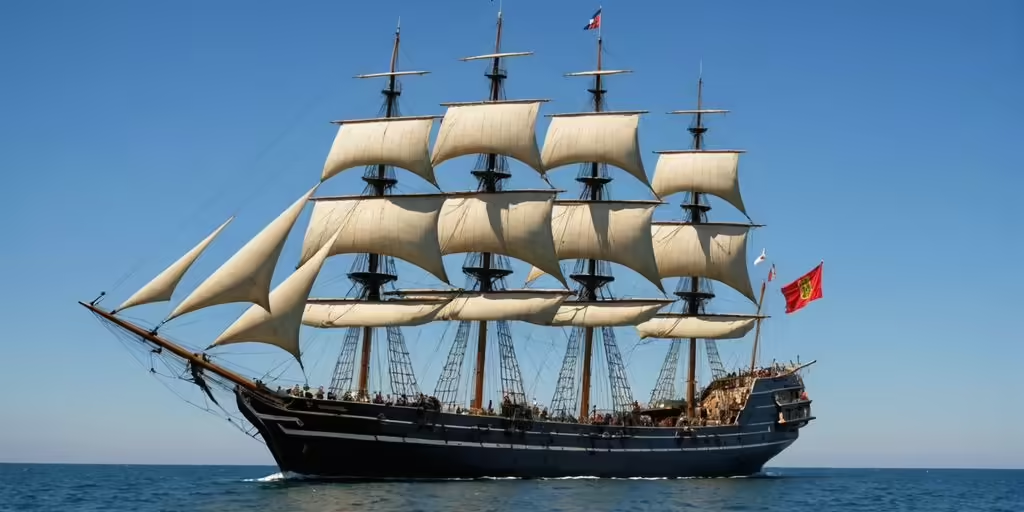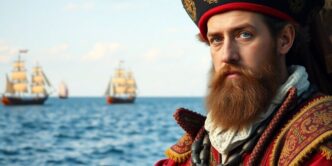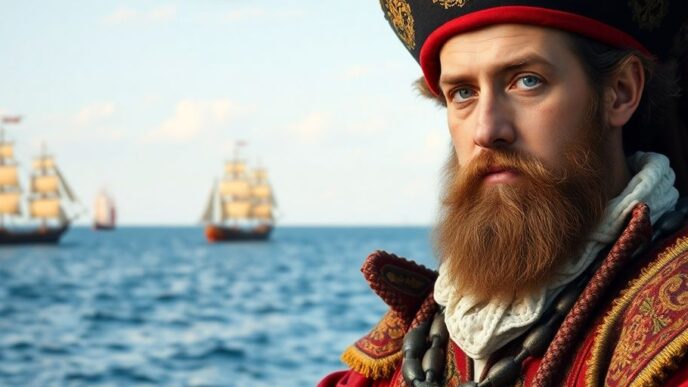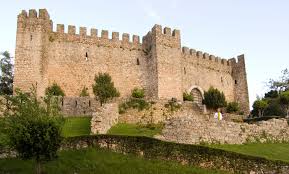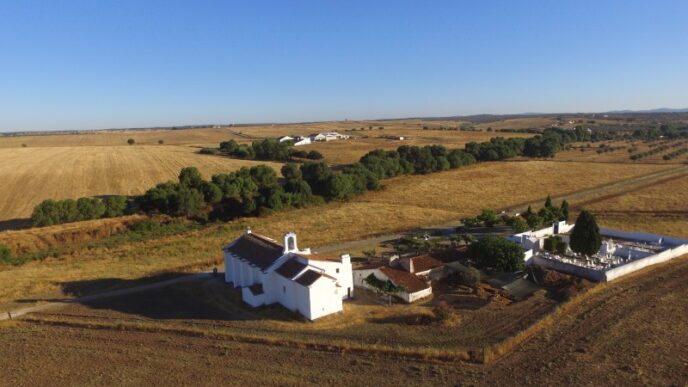Creation and Early Battles of the Portuguese Navy
The Battle of Cape Espichel
The first recorded battle of the Portuguese Navy took place in 1180. During this battle, a Portuguese fleet led by the knight Fuas Roupinho defeated a Muslim fleet near Cape Espichel. Fuas Roupinho also led two more attacks on Ceuta in 1181 and 1182, but he died during the second attempt.
Role in the Portuguese Reconquista
In the 13th century, the Portuguese Navy played a key role in the Reconquista. It helped capture several coastal Moorish towns, including Alcácer do Sal, Silves, and Faro. The navy also participated in battles against Castile, launching raids in Galicia and Andalusia, and joined forces with other Christian fleets to fight against the Muslims.
Establishment of a Permanent Naval Force
In 1317, King Denis of Portugal took a significant step by establishing a permanent naval force. He appointed Manuel Pessanha of Genoa as the first Admiral of Portugal. By 1321, the navy had successfully attacked Muslim ports in North Africa. This period also saw the beginning of maritime insurance in 1323 and the first attempts at maritime expansion between 1336 and 1341, with expeditions to the Canary Islands sponsored by King Afonso IV.
Portuguese Naval Power During the Age of Discovery

Development of Advanced Ships
During the Age of Discovery, the Portuguese Navy developed some of the most advanced ships of the time. The caravel, a small, highly maneuverable sailing ship, was one of their key innovations. These ships allowed Portuguese explorers to travel further and faster than ever before. The development of the nau, a larger ship capable of carrying more cargo, also played a crucial role in their maritime dominance.
Key Explorations and Discoveries
Portuguese explorers made numerous significant discoveries during this period. In 1488, Bartolomeu Dias became the first European to sail around the southern tip of Africa, opening the sea route to Asia. In 1498, Vasco da Gama reached India, establishing a direct maritime link between Europe and Asia. These explorations were pivotal in expanding the Portuguese Empire and establishing their dominance in global trade.
Dominance in the Indian Ocean
The Portuguese Navy’s dominance extended to the Indian Ocean, where they established a series of strategic ports and fortresses. This control allowed them to dominate the spice trade and other lucrative markets. The Portuguese India Armadas, powerful fleets sent annually to protect their interests, ensured that Portugal remained a leading maritime power throughout the 16th century.
Challenges During the Habsburg Dynasty

Conflicts with European Powers
When King Philip of Spain took the Portuguese throne in 1580, Portugal’s navy faced many challenges. Despite being part of the Iberian Union, Portugal’s navy had to fight against pirates and defend its empire from attacks by the English, French, and Dutch. These nations were enemies of Spain, and their attacks weakened the Portuguese empire. The small Portuguese population, about one million, couldn’t hold off so many enemies, leading to the empire’s decline.
Naval Engagements in the Mediterranean
The Portuguese navy was still active in the Mediterranean during this time. António Saldanha led a fleet of 30 carracks and defeated an Ottoman fleet, even capturing Tunis. João Queirós also made a significant achievement by crossing the Pacific Ocean twice, starting from California. These actions showed the navy’s courage and determination despite the challenges.
The Decline of Portuguese Naval Supremacy
Linked to Spain by a dual monarchy, Portugal saw its large empire being attacked by multiple European powers. The reduced Portuguese population wasn’t enough to resist so many enemies, and the empire started to fall apart. In 1618, the first naval infantry regiment was founded, which is the origin of the modern Portuguese Marine Corps. However, the continuous conflicts and the weak economy led to the decline of Portuguese naval supremacy.
The Portuguese Navy in the 18th Century
Transformation Under King John V
During the reign of King John V, the Portuguese Navy underwent significant changes. Warships began to differ from merchant ships, marking a new era in naval design. In 1705, a squadron of eight ships of the line sailed to Gibraltar to assist England against Spain and France.
The Battle of Matapan
In 1717, the Portuguese Navy engaged the Ottoman Navy in the Battle of Matapan. This battle was part of a larger effort to curb Ottoman influence in the Mediterranean. The Portuguese fleet, supported by Venetian and Maltese ships, achieved a decisive victory.
Reforms and Modernization Efforts
From 1770, under the leadership of D. Martinho de Melo e Castro, the Portuguese Navy saw extensive reforms. The old practice of naming ships after saints was replaced with names of mythical, historical, or royal figures. In 1792, the Royal Academy of the Midshipmen was established, laying the foundation for modern naval education in Portugal and Brazil. Additionally, in 1793, Portugal joined England and Spain against France, sending a naval division to assist the English Mediterranean fleet.
19th Century to World War I

Impact of the Napoleonic Wars
The Napoleonic Wars had a significant impact on the Portuguese Navy. During this period, Portugal found itself caught between the interests of France and Britain. The navy had to navigate complex alliances and conflicts, which often strained its resources and capabilities.
The Portuguese Civil War
The Portuguese Civil War, also known as the Liberal Wars, further tested the navy. The conflict between liberal and absolutist factions led to several naval engagements. The navy played a crucial role in supporting the liberal cause, which eventually triumphed.
Modernization and New Warships
In the late 19th and early 20th centuries, the Portuguese Navy underwent significant modernization. New warships were commissioned, and efforts were made to update naval tactics and training. This period saw the introduction of more advanced ships, which helped to enhance the navy’s operational effectiveness.
World War II and Overseas Wars

Naval Operations in World War II
During World War II, the Portuguese Navy played a crucial role in defending Portugal’s neutrality. One of the main concerns was protecting the strategic Atlantic islands of the Azores from potential invasion. Despite having limited resources due to Portugal’s vast overseas empire, the Navy managed to maintain the integrity of most territories. However, Portuguese Timor was occupied by Australia and the Netherlands, and later by Japan from 1942 to 1945.
After the war ended in 1945, the Portuguese Navy organized an expedition to reoccupy Timor and restore Portuguese sovereignty. The naval component included the avisos NRP Bartolomeu Dias, NRP Gonçalves Zarco, and NRP Afonso de Albuquerque, along with two transport ships carrying about 2,000 troops.
Portugal was also one of the founding members of NATO after World War II, contributing a fleet that included submarines, frigates, patrol boats, mine-sweepers, mine-hunters, and survey vessels.
Conflicts in Asia and Africa
In the second half of the 20th century, the Portuguese Navy found itself in combat again, this time in the Indian Ocean against India and in Africa during the Colonial War. The Navy expanded its global command, control, and logistics capabilities to cover all Portuguese overseas territories and their waters. Naval commands were established in Cape Verde, Angola, Mozambique, and Goa, in addition to those in mainland Portugal and the Azores.
Post-War Activities and Reorganization
After World War II, the Portuguese Navy focused on reorganization and modernization. This included developing a worldwide communications network with naval radio stations in all Portuguese overseas territories. The Navy was responsible for providing long-range inter-territorial radio communications for all branches of the Portuguese Armed Forces. This effort was part of a broader strategy to maintain control and coordination across Portugal’s global empire.
The Modern Portuguese Navy
Current Roles and Missions
Today, the Portuguese Navy has two main jobs. First, it protects Portugal’s waters and keeps the country safe. Second, it helps with international missions, mostly with NATO. The navy also does coast guard work, like saving people at sea and stopping illegal fishing.
Technological Advancements
The Portuguese Navy has made many technological advancements. They have new ships and better equipment. For example, they have modern submarines and patrol boats. These upgrades help the navy do its job better and stay up-to-date with other big navies.
International Collaborations and NATO Involvement
The Portuguese Navy works closely with other countries. They are part of NATO and join in many international missions. This teamwork helps them learn new skills and share their own knowledge. It also makes the navy stronger and more prepared for any challenge.
Frequently Asked Questions
What was the first known battle of the Portuguese Navy?
The first known battle of the Portuguese Navy took place in 1180. It was led by the knight Fuas Roupinho, who defeated a Muslim fleet near Cape Espichel.
How did the Portuguese Navy contribute during the Age of Discovery?
During the Age of Discovery, the Portuguese Navy developed advanced ships like the caravel and played a key role in major explorations, including Vasco da Gama’s voyage to India and the discovery of Brazil.
What challenges did the Portuguese Navy face during the Habsburg Dynasty?
During the Habsburg Dynasty, the Portuguese Navy faced conflicts with European powers like England, France, and the Netherlands, which led to a decline in its naval supremacy.
How did the Portuguese Navy change in the 18th century?
In the 18th century, the Portuguese Navy underwent significant transformations under King John V, including modernization efforts and participation in battles such as the Battle of Matapan.
What role did the Portuguese Navy play in World War II?
In World War II, the Portuguese Navy conducted various naval operations and later took part in post-war activities and reorganization efforts.
What is the modern role of the Portuguese Navy?
Today, the Portuguese Navy focuses on national defense, international collaborations, and missions within NATO, while also embracing technological advancements.

